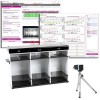Authors
Iborra-Lázaro G, Djebari S, Sánchez-Rodríguez I, Gratacòs-Batlle E, Sánchez-Fernández N, Radošević M, et al
Lab
University of Castilla-La Mancha, Ciudad Real, Spain
Journal
J Physiol
Abstract
Carnitine palmitoyltransferase 1c (CPT1C) is a neuron-specific protein widely distributed throughout the CNS and highly expressed in discrete brain areas including the hypothalamus, hippocampus, amygdala and different motor regions. Its deficiency has recently been shown to disrupt dendritic spine maturation and AMPA receptor synthesis and trafficking in the hippocampus, but its contribution to synaptic plasticity and cognitive learning and memory processes remains mostly unknown. Here, we aimed to explore the molecular, synaptic, neural network and behavioural role of CPT1C in cognition-related functions by using CPT1C knockout (KO) mice. CPT1C-deficient mice showed extensive learning and memory deficits. The CPT1C KO animals exhibited impaired motor and instrumental learning that seemed to be related, in part, to locomotor deficits and muscle weakness but not to mood alterations. In addition, CPT1C KO mice showed detrimental hippocampus-dependent spatial and habituation memory, most probably attributable to inefficient dendritic spine maturation, impairments in long-term plasticity at the CA3-CA1 synapse and aberrant cortical oscillatory activity. In conclusion, our results reveal that CPT1C is not only crucial for motor function, coordination and energy homeostasis, but also has a crucial role in the maintenance of learning and memory cognitive functions. KEY POINTS: CPT1C, a neuron-specific interactor protein involved in AMPA receptor synthesis and trafficking, was found to be highly expressed in the hippocampus, amygdala and various motor regions. CPT1C-deficient animals exhibited energy deficits and impaired locomotion, but no mood changes were found. CPT1C deficiency disrupts hippocampal dendritic spine maturation and long-term synaptic plasticity and reduces cortical γ oscillations. CPT1C was found to be crucial for motor, associative and non-associative learning and memory.
BIOSEB Instruments Used:
Tail Suspension Test - Wireless (BIO-TST5)

 Douleur - Allodynie/Hyperalgésie Thermique
Douleur - Allodynie/Hyperalgésie Thermique Douleur - Spontanée - Déficit de Posture
Douleur - Spontanée - Déficit de Posture Douleur - Allodynie/Hyperalgésie Mécanique
Douleur - Allodynie/Hyperalgésie Mécanique Apprentissage/Mémoire - Attention - Addiction
Apprentissage/Mémoire - Attention - Addiction Physiologie & Recherche Respiratoire
Physiologie & Recherche Respiratoire
 Douleur
Douleur Système Nerveux Central (SNC)
Système Nerveux Central (SNC)  Neurodégénérescence
Neurodégénérescence Système sensoriel
Système sensoriel Système moteur
Système moteur Troubles de l'humeur
Troubles de l'humeur Autres pathologies
Autres pathologies Système musculaire
Système musculaire Articulations
Articulations Métabolisme
Métabolisme Thématiques transversales
Thématiques transversales SFN2024: Venez rencontrer notre équipe sur le stand 876 à Chicago
SFN2024: Venez rencontrer notre équipe sur le stand 876 à Chicago 